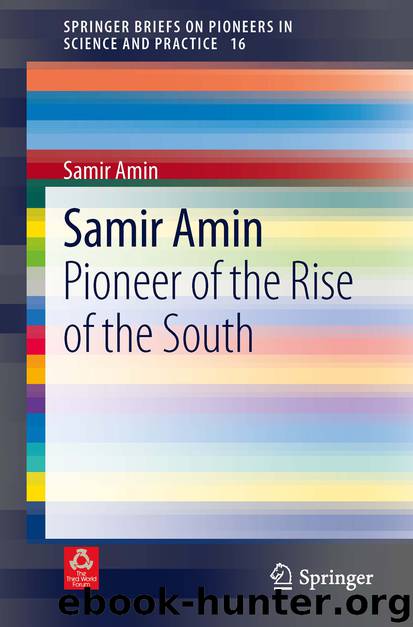Samir Amin by Samir Amin

Author:Samir Amin
Language: eng
Format: epub
Publisher: Springer International Publishing, Cham
9.4 The Ideology of Cultural Nostalgia, Enemy of Democracy
The specific limits of each and of all national/populist experiments worthy of the name ‘populist’ originate in the objective conditions characterizing the societies comprising the periphery of today’s capitalist/imperialist world—conditions obviously diverse. But beyond that diversity some major converging factors shed some light on the reasons for those experiments’ successes and then for their retrogressions.
That aspirations for a ‘Return to the Past’ persist is not the result of thoroughgoing ‘backwardness’ (as in the usual discourse on this subject) among the peoples involved. Their persistence gives a correct measure of the challenge to be confronted. All the peoples and nations of the peripheries were not only subject to fierce economic exploitation by imperialist capital: they were, by the same token, equally subjected to cultural aggression. With the greatest contempt the dignity of their cultures, their languages, their customs, and their histories were negated. There is nothing surprising in these victims of external or internal colonialism (notably the Indian populations of the Americas) naturally linking their political and social liberation to the restoration of their national dignity. But in turn, these legitimate aspirations are a temptation to look exclusively toward the past in hope of there finding the solution to today’s and tomorrow’s problems. So there is a real risk of seeing the movements of awakening and liberation among these peoples getting stuck in tragic blind alleys as soon as they mistake retrogressive nostalgia for their sought-for highroad of renewal.
The history of contemporary Egypt illustrates perfectly the transformation from necessary complementarity between a universalist vision open to the future, yet linked to the restoration of past dignity, into a conflict between two options formulated in absolute terms: either ‘Westernize!’ (in the common usage of that term, implying denial of the past) or else (uncritically) ‘Back To The Past!’
The Viceroy Mohamed Ali (1804–1849) and, until the 1870s, the Khedives, chose a modernization that would be open to the adoption of formulas reflecting European models. It cannot be said that this choice was one of ‘Westernization’ on the cheap. The heads of the Egyptian state gave the highest importance to modern industrialization of the country as against merely adopting the European model of consumer markets. They committed themselves to assimilation of European models, linking it with renewal of their national culture to whose evolution in a secular direction it would contribute. Their attempts to support linguistic renovation bear witness to that. Of course, their European model was that of capitalism and no doubt they had no accurate conception of the imperialist nature of European capitalism. But they should bear no reproach for that. When Khedive Ismail proclaimed his aim ‘to make Egypt into a European country’, he was fifty years ahead of Ataturk. He saw ‘Europeanization’ as part of national rebirth, not as a renunciation of it.
The inadequacies of that epoch’s cultural Nahda (its inability to grasp the meaning of the European Renaissance), and the retrograde nostalgia embodied in its main concepts—on which I have expressed myself elsewhere—are no mystery.
Download
This site does not store any files on its server. We only index and link to content provided by other sites. Please contact the content providers to delete copyright contents if any and email us, we'll remove relevant links or contents immediately.
| Anarchism | Communism & Socialism |
| Conservatism & Liberalism | Democracy |
| Fascism | Libertarianism |
| Nationalism | Radicalism |
| Utopian |
The Secret History by Donna Tartt(19088)
The Social Justice Warrior Handbook by Lisa De Pasquale(12190)
Thirteen Reasons Why by Jay Asher(8909)
This Is How You Lose Her by Junot Diaz(6886)
Weapons of Math Destruction by Cathy O'Neil(6279)
Zero to One by Peter Thiel(5802)
Beartown by Fredrik Backman(5754)
The Myth of the Strong Leader by Archie Brown(5507)
The Fire Next Time by James Baldwin(5444)
How Democracies Die by Steven Levitsky & Daniel Ziblatt(5218)
Promise Me, Dad by Joe Biden(5153)
Stone's Rules by Roger Stone(5087)
A Higher Loyalty: Truth, Lies, and Leadership by James Comey(4963)
100 Deadly Skills by Clint Emerson(4925)
Rise and Kill First by Ronen Bergman(4788)
Secrecy World by Jake Bernstein(4753)
The David Icke Guide to the Global Conspiracy (and how to end it) by David Icke(4718)
The Farm by Tom Rob Smith(4509)
The Doomsday Machine by Daniel Ellsberg(4490)
